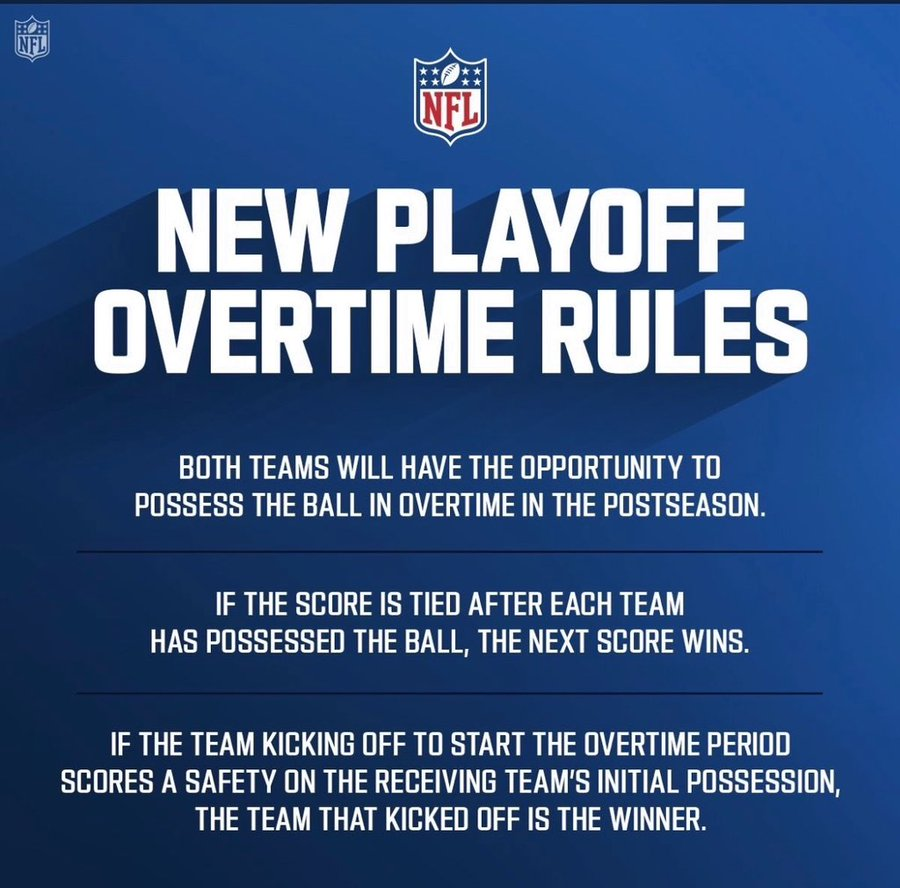The NFL playoffs are a thrilling time of year, but the excitement can quickly turn to heartbreak for one team when overtime rolls around. The NFL’s overtime rules have undergone several changes over the years, and understanding them can be crucial for fans and bettors alike.
Sudden Death Overtime (Pre-2010)
Before the 2010 season, the NFL used a “sudden death” overtime format.
The Basics: The team that won the coin toss received the ball first and had a chance to score a touchdown or field goal.
This system often felt unfair, as the team that won the coin toss had a significant advantage.
The 2010 Rule Change

Recognizing the inherent unfairness of the old system, the NFL implemented a new overtime rule in 2010.
The Basics:
This rule change aimed to ensure that both teams had a fair chance to score before the game ended abruptly.
The 2017 Rule Change (for Regular Season Only)
In 2017, the NFL introduced another rule change, but only for the regular season.
The Basics: If the team that receives the ball first scores a touchdown on their opening drive, the game is over.
This rule aimed to prevent games from ending abruptly after a single field goal.
The 2021 Rule Change (for Regular Season and Playoffs)
The most recent significant change to the NFL overtime rules occurred in 2021. This rule applies to both the regular season and the playoffs.
The Basics:
This rule change aimed to balance fairness with the excitement of a potential game-winning touchdown.
Key Takeaways
Fairness: The current overtime rules prioritize fairness by giving both teams a chance to possess the ball.
Understanding the Rules: A Deeper Dive
Coin Toss: The team that wins the coin toss usually chooses to receive the ball first, although they can defer their choice to the second half.
Potential Scenarios
Scenario 1: Team A receives the ball first and scores a touchdown. Team A wins the game.
The Impact of the Rules on Strategy
The current overtime rules have a significant impact on game strategy.
Offensive Approach: Teams may become more aggressive on offense during overtime, knowing that a touchdown can end the game.
The Role of Special Teams
Special teams play a crucial role in overtime.
Kickoffs: A strong kickoff can give the receiving team poor field position, making it more difficult for them to score.
The Impact of the Rules on Fans and Bettors
The NFL overtime rules have a significant impact on fans and bettors.
Fan Experience: The current rules create a more exciting and unpredictable overtime experience for fans.
Controversies and Debates
Despite the efforts to improve fairness, the NFL overtime rules continue to be a source of controversy and debate.
Sudden Death: Some argue that sudden death overtime is inherently unfair, as the team that wins the coin toss has a significant advantage.
Looking Ahead
The NFL overtime rules are likely to continue to evolve in the years to come.
Potential Changes: Future rule changes could address issues such as sudden death overtime, the impact of the touchdown rule, and the role of special teams.
Conclusion
The NFL overtime rules are a complex and constantly evolving aspect of the game. Understanding these rules is crucial for fans, bettors, and anyone who wants to fully appreciate the excitement and drama of the NFL playoffs. While the current rules aim to balance fairness and excitement, debates and controversies surrounding overtime are likely to continue. As the NFL continues to evolve, so too will its overtime rules, ensuring that this thrilling period of the season remains a source of excitement and intrigue for years to come.


/cdn.vox-cdn.com/uploads/chorus_asset/file/25378171/2139238696.jpg?w=200&resize=200,112&ssl=1)


.jpg?auto=webp&format=pjpg&width=3840&quality=60&w=200&resize=200,112&ssl=1)
